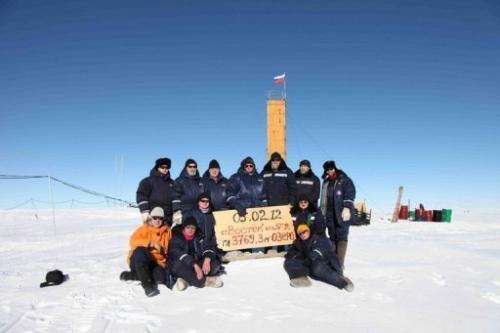Russian researchers pose for a picture after reaching the subglacial Lake Vostok in Antarctica on February 5, 2012. Russian scientists on Saturday dismissed initial reports that they had found a wholly new type of bacteria in a mysterious subglacial lake in Antarctica.
Russian scientists on Saturday dismissed initial reports that they had found a wholly new type of bacteria in a mysterious subglacial lake in Antarctica.
Sergei Bulat of the genetics laboratory at the Saint Petersburg Institute of Nuclear Physics had said Thursday that samples obtained from the underground Lake Vostok in May 2012 contained a bacteria bearing no resemblance to existing types.
But the head of the genetics laboratory at the same institute said on Saturday that the strange life forms were in fact nothing but contaminants.
"We found certain specimen, although not many. All of them were contaminants" that were brought there by the lab during research, Vladimir Korolyov told the Interfax news agency.
"That is why we cannot say that previously-unknown life was found," he said.
Lake Vostok is the largest subglacial lake in Antarctica and scientists have long wanted to study its eco-system. The Russian team last year drilled almost four kilometres (2.34 miles) to reach the lake and take the samples.
Russia had been hoping to discover a new life form at the pristine site and the drilling was of major importance for the prestige to the country's science programme.
Russian leader Vladimir Putin was even given a sample of Lake Vostok water after the drilling was performed.
(c) 2013 AFP























